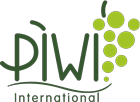ORGANIC WINE AWARD INTERNATIONAL - Autumn tasting
Press release: WINE SYSTEM - Trust Your Senses
First competition after extensive re-branding: WINE SYSTEM invites you to the autumn edition of the ORGANIC WINE AWARD INTERNATIONAL
New look, new name, new date: The PAR® tasting will take place from October 1st to 4th, 2021, the registration deadline is August 27th.
Frasdorf, July 2021 - With a new brand identity and unbroken enthusiasm for the heart of wine and sensor technology, WINE SYSTEM - Trust your Senses is inviting you to the 14th ORGANIC WINE AWARD INTERNATIONAL, as the international organic wine award, which is well known in the industry, is now uniformly called for all countries. A total of four tasting days are scheduled for the autumn edition, because after the recent sharp rise in participation numbers, the jury wants to ensure in October that the PAR®'s own high standards are guaranteed. It is still unclear whether the competition will be the first since the beginning of the pandemic to take place in attendance *). Regardless of the framework, participants can rely on the usual objectivity, transparency and comprehensibility of the qualitative assessments. Every organic wine submitted is given the appreciation it deserves - in the form of an evaluation that goes beyond trends and norms. The basis is the product, its origin and individual design.
First PIWI vineyard in Chiemgau

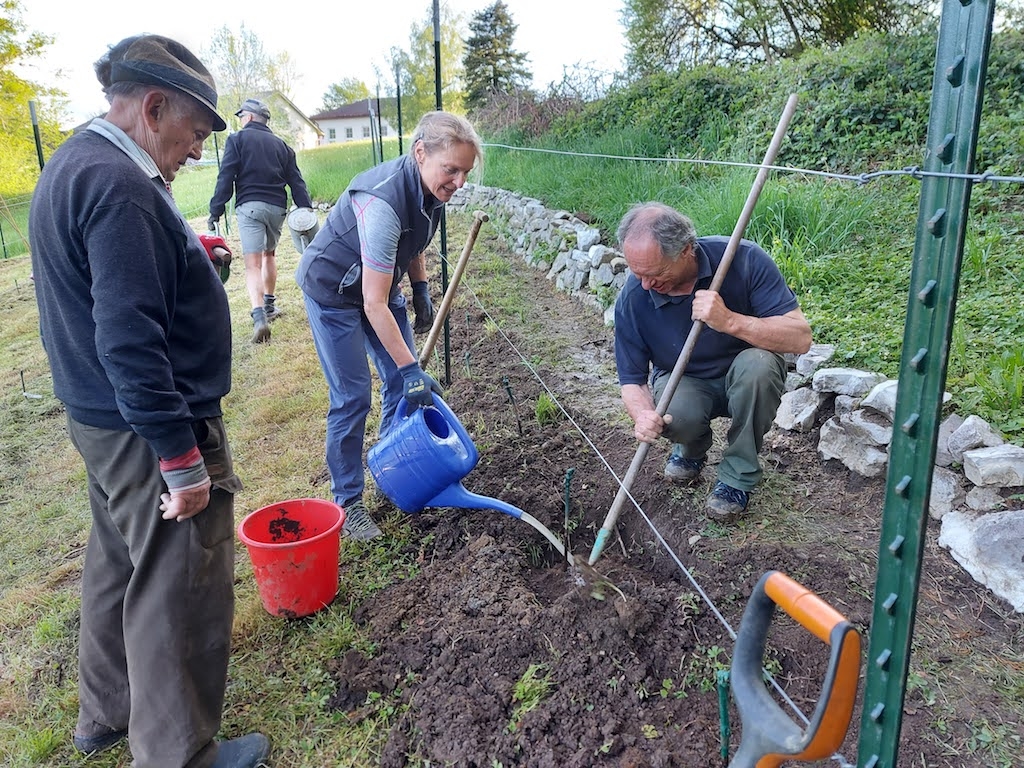
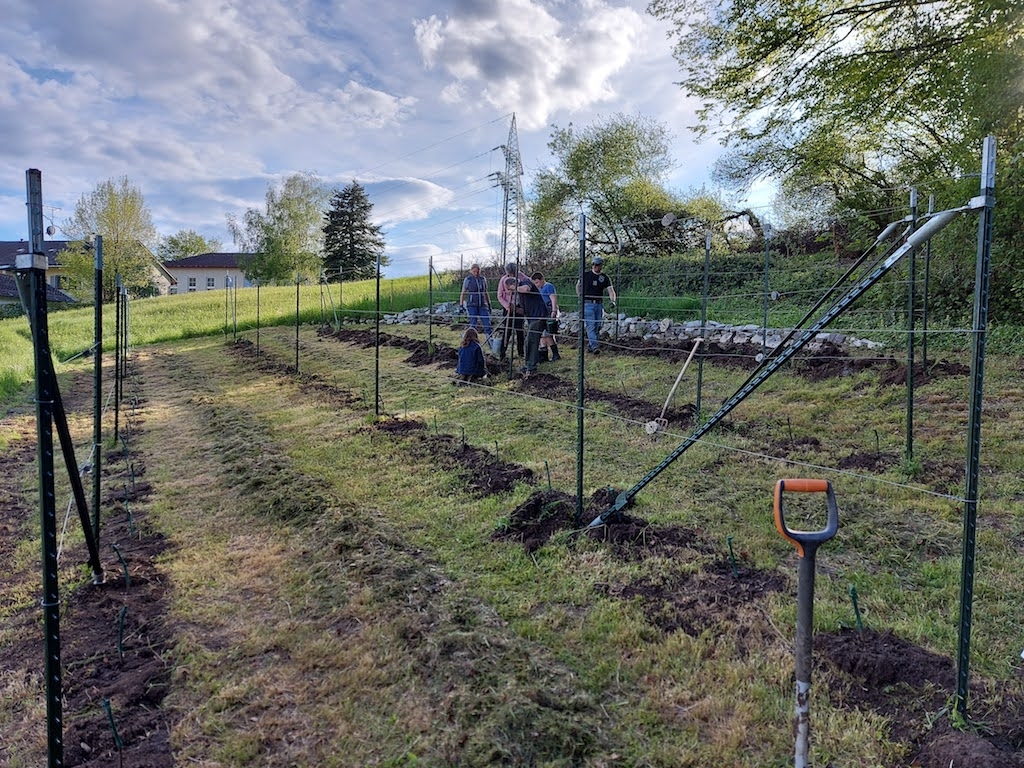 Gartenbauverein von Prien am Chiemsee pflanzt PIWI in St. Salvator
Gartenbauverein von Prien am Chiemsee pflanzt PIWI in St. Salvator
Auf dem Weinberg in St. Salvator sprießen seit einigen Wochen rund 100 Rebstöcke einer ganz besonderen Züchtung. In einer mehrstündigen Aktion pflanzten Mitglieder des Gartenbauvereins Prien und Umgebung pilzwiderstandsfähige PIWI-Rebsorten.
Solaris, Johanniter, Nero und Bianca heißen die Reben, die auf Initiative von Gisela Wüstinger in St. Salvator gepflanzt wurden. In Reih und Glied stehen die Rebstöcke seit Mitte Mai dank der Arbeit einer Handvoll Freiwilliger des Gartenbauvereins (GBV). Vor Jahren hatte der Verein an diesem Hang schon einmal einen Weinberg angelegt. „Massiver Mehltaubefall machte jedoch eine Rodung erforderlich“, ruft Christian Steinbichler, Baumwart des GBV, in Erinnerung und hofft durch die pilzresistenten Sorten jetzt auf einen ansehnlichen Ertrag.
Priener_Gartenbauverein_pflanzt_PIWI_in_St._Salvator (PDF) German
Mushroom-resistant grape varieties have many advantages -
- but winemakers and consumers are critical of them.
Source: May 20, 2021 by Raffaella Usai - Wein-plus
When they hear the name “Piwi” wines, many wine connoisseurs turn up their noses quickly. Because so far very few have tried good or even excellent wines made from fungus-resistant varieties. Good for the environment, yes, but also good for the palate? The list of prejudices is long. Piwis are a complex topic that requires courage and curiosity from producers and connoisseurs.
First meeting of the new regional group PIWI CZ (Czech Republic)
On June 8, 2021, the first face-to-face meeting of the members of the PIWI CZ regional group, which will operate within the organizational structure of the Viticulture Association of the Czech Republic, took place in Velké Bílovice.
The group was founded in March of this year, the founding declaration was signed by 8 founding members and approved by the board of the Viticulture Association. This act was a continuation of the activities of the Mendel University in Brno and the Science and Production Association Resistant Velké Bílovice, which began in 1986 with the first planting of experimental vineyards with PIWI varieties, mainly bred in Hungary, Moldova, Ukraine, Russia and Germany , started.
wine4future: Bergstrasse winemakers present a new label for sustainable viticulture
The Bergstrasse winemakers are introducing a special label for the robust grape varieties of the future. From now on, these varieties will be used for sustainable viticulture in the age of climate change with our label "wine4future" .
While grape varieties such as Riesling, Pinot Gris or Sauvignon Blanc are known to every wine drinker, the situation is different with the new so-called "PIWI" grape varieties such as Muscaris, Solaris and Souvignier Gris. They have names that many wine lovers do not yet know. Their marketing is therefore a major challenge. The term "PIWI" stands for pilzwiresilience. Classic grape varieties are dependent on pesticides (fungicides) against fungal diseases such as downy and real powdery mildew. Without regular use of these "repellants", both conventional and organic wine production from them is nowhere possible. The new robust grape varieties, however, hardly need these means, since resistance genes from wild grapes were crossed using traditional manual crossing techniques. This means that they are naturally more resistant to fungal diseases. It goes without saying that this is good for the environment. The application of fewer pesticides saves both working time and energy, as less fuel is required for the tractor. In addition, valuable vineyard soil is less burdened with passages and soil compaction. Because of their stronger growth, these varieties also require less fertilization. The environment is thus better protected overall and nature conserved. All of this means better CO2-Balance in regional viticulture. So far, so good, but the problem is that many wine lovers are not yet familiar with the new grape varieties and are hardly aware of the advantages.
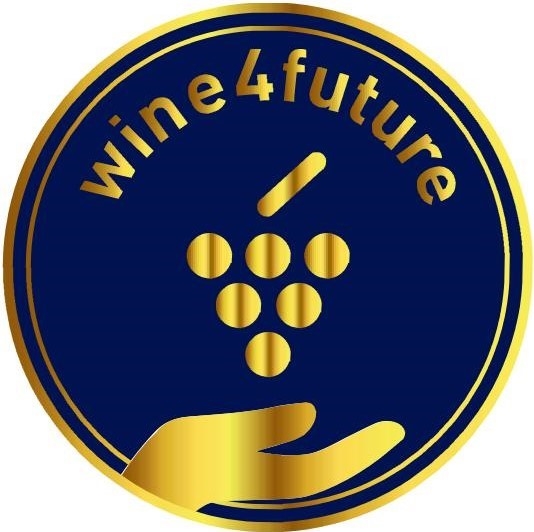
Origin and style - online tasting and lecture according to PAR® by Martin Darting
Dear members of PIWI International,
we are pleased to invite you to a special kind of online tasting.
With winning wines from the PIWI Wine Award 2020 Martin Darting has prepared a lecture with tasting.
Using the PAR® arches of these specially selected wines, we deal with the brand new topic:
Origin, but also style and the peculiarities of PIWI red wines.
Date: Tuesday, June 22nd, 2021 - 7:30 p.m. to 9:30 p.m.
Via Zoom - You will receive the invitation link a few days before the tasting after you have ordered the package and paid for it.
The event takes place in German and English.
Be there and secure your wine package (only while stocks last) until Sunday June 6th 2021.
Please order easily here in the online shop of Treffpunkt Wein eK and secure your participation in the seminar.
The package is available exclusively for PIWI International members and can only be reached via this link.
The payment processing of the parcels takes place via Treffpunkt Wein eK. The seminar is free for members of PIWI International. The dispatch takes place exclusively after receipt of payment.
We look forward to your registration and to an exciting evening with interesting wines and Martin Darting!
The package contains the following wines and costs € 92.00 including VAT. excl. Shipping :
Barfod Vin - Danmark - Souvignier Gris 2019
Biohof Kobatl - Austria - Souvignier Gris 2018
Lehengut - Italy - GEGENWIND 2019 Souvignier Gris
Domaine Pugibet - France - Au Creux Du Nid 2020 - Cabernet Blanc
La Cantina Pizzolato - Italy - Red wine Veneto "Konti-Ki" IGT 2020 - Merlot Khorus, Cabernet Cortis, Prior
Weingut Galler - Germany - Kunigunde 2018 - Satin Noir
If you have any questions, please contact Gisela Wüstinger - mitglieder@piwi-international.org
many Greetings
Your PIWI International team
international organic wine award: the spring tasting 2021 with 812 organic wines from 21 countries
Online tasting according to PAR® with a strong increase in participation and international diversity at the top - top topic: quality management in times of the climate crisis
Frasdorf, May 2021 - Agility and reliability: It is probably due to these two characteristics that WINE System AG and the now 13th international organic wine award owe the large increase in participation with which the spring tasting from May 7th to 10th, 2021 starts went. Because as flexibly as the team around board members Brigitte Wüstinger and Martin Darting reacted to the changed requirements due to the pandemic at the beginning of 2020, the results of the PAR® jury, which now met again in the virtual tasting room *), are reliable by more than 800 Organic wines from 21 countries can be classified qualitatively. The 28 PAR® Certified Masters awarded a total of 69 Grand Gold, 341 Gold, 351 Silver and 44 recommendations. The overall winner of the tasting is the 2018 AUSLESE Sauvignon Blanc from the Weiss Beate and Eric organic winery on Austria's Neusiedlersee, with 99 points.
Invitation to the Falstaff PiWi Trophy 2021
We broke new ground with the PiWi tasting last year - at the suggestion of our Swiss Falstaff colleagues Benjamin Herzog and Dominik Vombach. "There's an incredible amount going on there," said the two of them at last year's editorial meeting when they announced that they would be holding such a competition in Switzerland. Thanks to the success of the PiWi tasting last year, our ambition was awakened again this year: Because we too are getting more and better wines from Cabernet blanc, Souvignier gris and Regent on the table. And of course those with completely different names and sometimes even with breed numbers. Time to take stock!
Are called dry wines from any fungus-resistant varieties (white, rosé, red) and all currently available vintages. Cuvées between PiWis and European varieties are permitted if the PiWi share in the cuvée is at least 75 percent. Wines from all types of aging, from stainless steel to classic wooden barrels to half-pieces, tonneau and barriques, are tasted and assessed at both trophies. Likewise, mash fermentations.
We'll talk about the results of the Trophy and the winners in the magazine 5/2021 report from Falstaff Germany (publication date: 14 July 2021). As usual, all results will also be integrated into the freely accessible wine database www.falstaff.com.
Price: Participation in the trophy costs 129 euros per wine employed (plus VAT)
Registration deadline: Monday, May 21, 2021
The Sending the sample (two bottles per wine) should be up from now May 21 at the latest to the following address:
Citilager (Locker Ramp)
zH Ulrich Sautter
password PiWi Trophy
Wandalenweg 33-35
20097 Hamburg
NEW: the Falstaff service point
Registration takes place on a new platform this year
FOR registration with the Bavarian State Institute for Viticulture and Horticulture
For the Online registration at the service point we strongly recommend the Entry via Google Chrome, which you can download for free from the Internet. Problems and display errors can occur with other browsers.
Note: In addition to the Falstaff PiWi Trophy, you can also apply for the Falstaff Riesling Kabinett Trophy Sign in. Registration for Falstaff Riesling cabinet Trophy can also be found in the service point! Participation in the trophy costs 129 euros per wine employed (plus VAT)
We look forward to your participation and are already looking forward to the results!
With best regards,
Ulrich Sautter
Falstaff editor-in-chief
and the Falstaff wine team
International magazine for food, drink and travel
Media owner and editor: Falstaff Verlag
Carlsplatz 18, 40213 Düsseldorf
PIWI Wein: Viticulture without chemicals with resistant grape varieties By Daniel Bayer with Martin Darting-
PIWI wines are made from fungus-resistant grape varieties that, due to their special properties, have some great advantages.
In this first part of the interview we clarify the question of how PIWI varieties are bred, how they came about and what benefits we can derive from cultivation and vinification.
As an interlocutor for this episode has Martin Darting agreed to share his knowledge with us. He is known as a sensory expert, author, winemaker and speaker and has researched in this and many other areas for many years. As a consultant, lecturer and wine connoisseur, he is a true icon in his field and does not shy away from de-romanticizing the world of wine a little and drawing a clear dividing line between marketing and wine language.
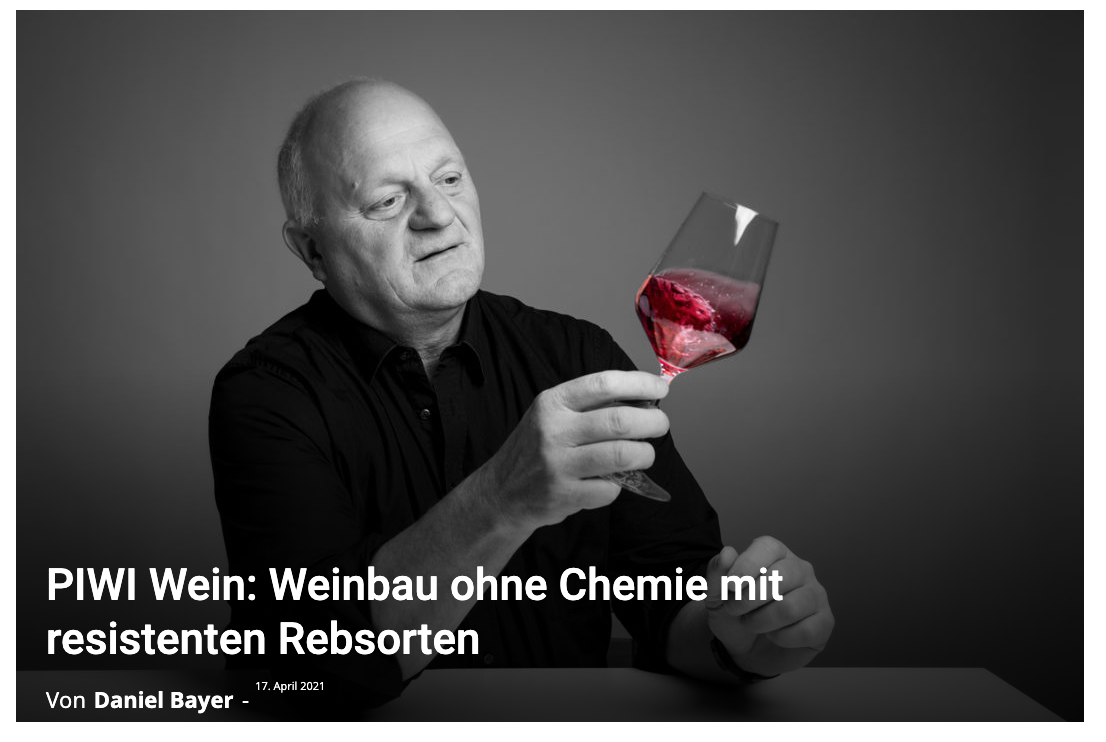
Are Piwi Grapes The Future Of Winemaking?
Fungus-resistant hybrid grapes could be the answer to environmentally sustainable winemaking.
Hello, Felicia! Undoubtedly, we were more than happy to see 2020 come to a close, but the year end did bring about a few silver linings. In the wine world, one such event was the official approval of new Piwi grape varietal, Felicia.
Short for “pilzwiderstandsfähig” (German for “fungus resistant”), Piwis are special hybrid crossings between vitis vinifera, the common European grape vine, and the mainly North American vitis species. While hybrid grapes are far from new, Piwis have gained attention in recent years thanks to the increased interest in and greater push for environmentally sustainable agriculture.
As native North American grape species are resistant to a variety of maladies their European counterparts are susceptible to, these hybrids carry a natural resistance to fungal diseases, reducing or even eliminating the need for spraying. This, in turn, significantly reduces the negative impact on the environment: less usage of chemical fungicides, lower emissions of carbon monoxide from tractors and a reduction in compacting of vineyard soils when tractors run over them, thus encouraging more micro-organisms in the soil.
There is not only an environmental upside to adopting Piwis. Jörg Philipp, Asia representative of Piwi International, a global association for the promotion of fungus-resistant grape varieties, lays down its financial advantages.
“Less usage of costly treatments and less need for driving through the vineyards (translating to savings of time, fuel and machinery input) lowers the cost of wine production in a significant way. Economically, the usage of Piwis is an important cost reducer.”
read more
Two new joint research projects to curb the golden yellowing of the vine
On the occasion of the handover of the funding notices for two new joint research projects to curb the golden yellow yellowing of the vine (Flavescence dorée = phytoplasmosis), which are coordinated by the vine protectors and vine breeders of the Julius Kühn Institute at the Geilweilerhof site in Siebeldingen, the JKI published the following homepage announcement.
Federal Minister Klöckner hands over funding notices for new JKI research projects on quarantine diseases in vines and fruit
On Monday (April 12th, 21st), Federal Minister of Agriculture Julia Klöckner handed over the grant notices from her ministry for the two new research projects "VectoScreen" and "PhytoMo" via video. In the am Julius Kühn Institute (JKI) in Siebeldingen The projects worked on are about the diagnosis of flavescence dorée, in English golden yellow, and the monitoring of the pathogen causing this vine disease and the insects that transmit it. The disease is caused by a bacterium without a cell wall, a so-called phytoplasm. This quarantine pest organism, which is worth fighting, or its vector insect, the American vine leafhopper, are finding better and better conditions in local wine regions. Diseased plants and pathogens are subject to transport bans within the EU and other measures that help prevent the introduction and spread of quarantine pathogens. Both projects are funded by the BMEL as part of the tender "Innovations to avoid the introduction and spread of regulated and new harmful organisms in plants".
High-resolution 3D phenotyping of the root system of the grapevine using X-ray computed tomography
The Julius Kühn Institute and the University of Nottingham in Great Britain examined the roots of young potted vines of 'Calardis Musqué', 'Villard Blanc' and V3125 ('Schiava Grossa' x 'Riesling'). Non-invasive X-ray micro-computed tomography (X-ray µCT) methods were used to study the phenotypic variation of the complex three-dimensional (3D) architecture of vine roots as a function of genotype and soil. Lignified cuttings were cultivated in polypropylene columns filled with two different types of soil, clayey loam and sandy loam, for 6 weeks.
It could be shown that the individual root parameters such as B. Root length and number of side roots are clearly specific to the grape variety, i.e. genetically determined, and are less dependent on the type of soil.
